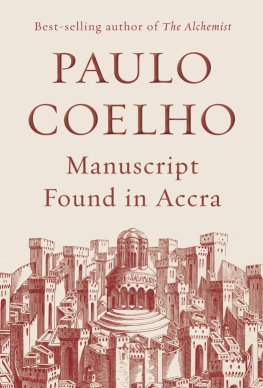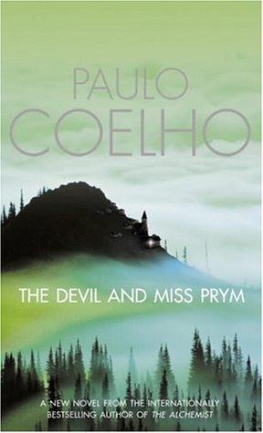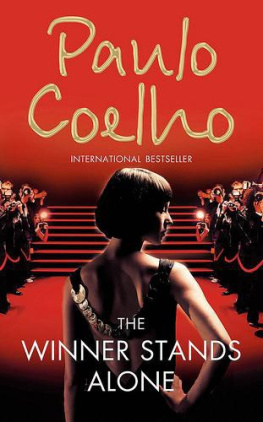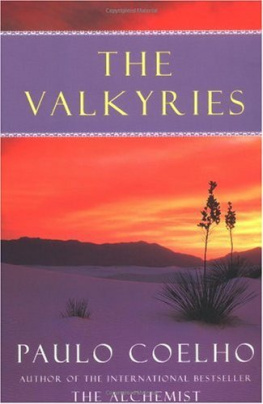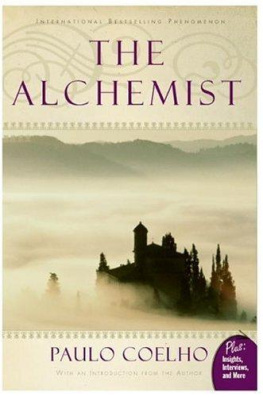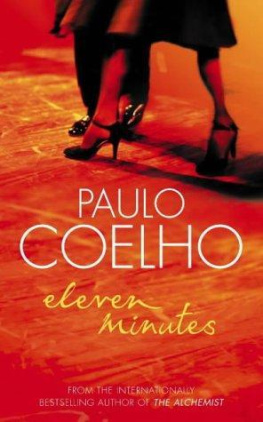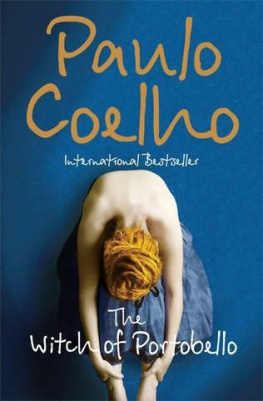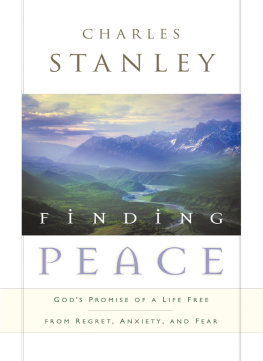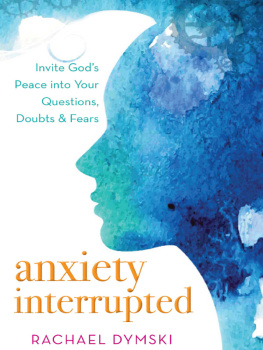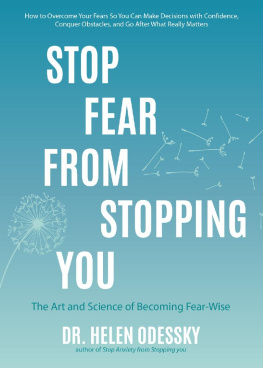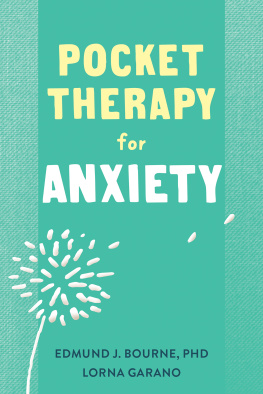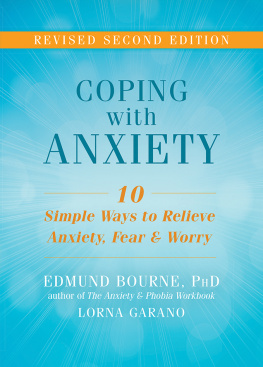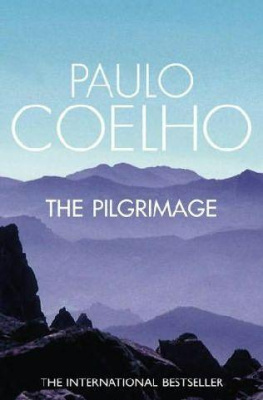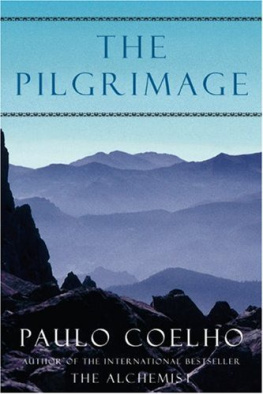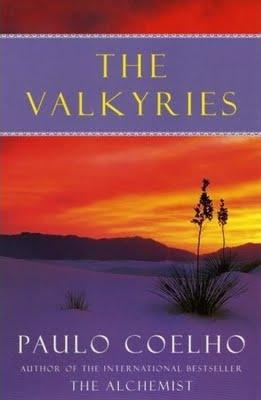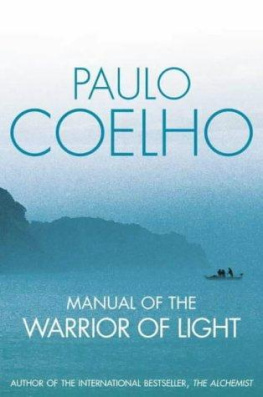Paulo Coelho
MANUSCRIPT FOUND IN ACCRA

Translated from the Portuguese by Margaret Jull Costa
O Mary, conceived without sin,
pray for those who turn to You. Amen.
For N.R.S.M.,
in gratitude for the miracle
Daughters of Jerusalem, weep not for me,
but weep for yourselves, and for your children.
Luke 23:28v

In December of 1945, two brothers looking for a place to rest found an urn full of papyruses in a cave in the region of Hamra Dom, in Upper Egypt. Instead of telling the local authoritiesas the law demandedthey decided to sell them singly in the market for antiquities, thus avoiding attracting the governments attention. The boys mother, fearing negative energies, burned several of the newly discovered papyruses.
The following year, for reasons history does not record, the brothers quarreled. Attributing this quarrel to those supposed negative energies, the mother handed over the manuscripts to a priest, who sold one of them to the Coptic Museum in Cairo. There, the papyruses were given the name they still bear to this day: manuscripts from Nag Hammadi (a reference to the town nearest to the caves where they were found). One of the museums experts, the religious historian Jean Doresse, realized the importance of the discovery and mentioned it for the first time in a publication dated 1948.
The other papyruses began to appear on the black market. The Egyptian government tried to prevent the manuscripts from leaving the country. After the 1952 revolution, most of the material was handed over to the Coptic Museum in Cairo and declared part of the national heritage. Only one text eluded them, and this turned up in an antiquarian shop in Belgium. After vain attempts to sell it in New York and Paris, it was finally acquired by the Carl Jung Institute in 1951. On the death of the famous psychoanalyst, the papyrus, now known as Jung Codex, returned to Cairo, where the almost one thousand pages and fragments of the manuscripts from Nag Hammadi are now to be found.

The papyruses are Greek translations of texts written between the end of the first century BC and AD 180, and they constitute a body of work also known as the Apocryphal Gospels because they are not included in the Bible as we know it today. Now, why is that?
In AD 170, a group of bishops met to decide which texts would form part of the New Testament. The criterion was simple enough: anything that could be used to combat the heresies and doctrinal divisions of the age would be included. The four gospels we know today were chosen, as were the letters from the apostles and whatever else was judged to be, shall we say, coherent with what the bishops believed to be the main tenet of Christianity. Reference to this meeting of the bishops and their list of authorized books can be found in the Muratorian Canon. The other books, like those found in Nag Hammadi, were omitted either because they were written by women (for example, the Gospel according to Mary Magdalene) or because they depicted a Jesus who was aware of his divine mission and whose passage through death would, therefore, be less drawn out and painful.

In 1974, the English archaeologist Sir Walter Wilkinson discovered another manuscript, this time written in three languages: Arabic, Hebrew, and Latin. Conscious of the laws protecting such finds in the region, he sent the text to the Department of Antiquities in the Museum of Cairo. Shortly afterward, back came a response: there were at least 155 copies of the document circulating in the world (three of which belonged to the museum), and they were all practically identical. Carbon-14 tests (used to determine the age of organic matter) revealed that the document was relatively recent, possibly as late as AD 1307. It was easy enough to trace its origin to the city of Accra, outside Egyptian territory. There were, therefore, no restrictions on its removal from the country, and Sir Walter received written permission from the Egyptian government (Ref. 1901/317/IFP-75, dated 23 November 1974) to take it back to England with him.

I met Sir Walters son in 1982, at Christmas, in Porthmadog in Wales. I remember him mentioning the manuscript discovered by his father, but neither of us gave much importance to the matter. We maintained a cordial relationship over the years and met on at least two other occasions when I visited Wales to promote my books.
On 30 November 2011, I received a copy of the text that he had mentioned at that first meeting. I transcribe it here.
Manuscript Found in Accra

I would so like to begin by writing:
Now that I am at the end of my life, I leave for those who come after me everything that I learned while I walked the face of this Earth. May they make good use of it.

Alas, that is not true. I am only twenty-one, my parents gave me love and an education, and I married a woman I love and who loves me in return. However, tomorrow, life will undertake to separate us, and we must each set off in search of our own path, our own destiny or our own way of facing death.
As far as our family is concerned, today is the fourteenth of July, 1099. For the family of Yakob, the childhood friend with whom I used to play in this city of Jerusalem, it is the year 4859he always takes great pride in telling me that Judaism is a far older religion than mine. For the worthy Ibn al-Athir, who spent his life trying to record a history that is now coming to a conclusion, the year 492 is about to end. We do not agree about dates or about the best way to worship God, but in every other respect we live together in peace.
A week ago, our commanders held a meeting. The French soldiers are infinitely superior and far better equipped than ours. We were given a choice: to abandon the city or fight to the death, because we will certainly be defeated. Most of us decided to stay.
The Muslims are, at this moment, gathered at the Al-Aqsa mosque, while the Jews choose to assemble their soldiers in Mihrab Dawud, and the Christians, who live in various different quarters, are charged with defending the southern part of the city.
Outside, we can already see the siege towers built from the enemys dismantled ships. Judging from the enemys movements, we assume that they will attack tomorrow morning, spilling our blood in the name of the Pope, the liberation of the city, and the divine will.
This evening, in the same square where, a millennium ago, the Roman governor Pontius Pilate handed Jesus over to the mob to be crucified, a group of men and women of all ages went to see the Greek, whom we all know as the Copt.
The Copt is a strange man. As an adolescent, he decided to leave his native city of Athens to go in search of money and adventure. He ended up knocking on the doors of our city, close to starvation. When he was well received, he gradually abandoned the idea of continuing his journey and resolved to stay.
He managed to find work in a shoemakers shop, andjust like Ibn al-Athirhe started recording everything he saw and heard for posterity. He did not seek to join any particular religion, and no one tried to persuade him otherwise. As far as he is concerned, we are not in the years 1099 or 4859, much less at the end of 492. The Copt believes only in the present moment and what he calls Moirathe unknown god, the Divine Energy, responsible for a single law, which, if ever broken, will bring about the end of the world.

